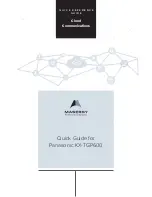
Battery Standby and Talk Time
Standby and talk times will vary depending on
phone usage patterns and conditions. Battery power
consumption depends on factors such as network
configuration, signal strength, operating temperature,
features selected, frequency of calls, and voice, data, and
other application usage patterns.
Battery Precautions
• Never use any charger or battery that is damaged in any
way.
• Use the battery only for its intended purpose.
• If you use the phone near the network’s base station,
it uses less power; talk and standby time are greatly
affected by the signal strength on the cellular network
and the parameters set by the network operator.
• Battery charging time depends on the remaining battery
charge and the type of battery and charger used. The
battery can be charged and discharged hundreds of
times, but it will gradually wear out. When the operation
time (talk time and standby time) is noticeably shorter
than normal, it is time to buy a new battery.
• If left unused, a fully charged battery will discharge itself
over time.
• Use only Samsung-approved batteries and recharge
your battery only with Samsung-approved chargers.
When a charger is not in use, disconnect it from the
power source. Do not leave the battery connected to a
charger for more than a week, since overcharging may
shorten its life.
• Extreme temperatures will affect the charging capacity
of your battery: it may require cooling or warming first.
• Do not leave the battery in hot or cold places, such as in
a car in summer or winter conditions, as you will reduce
the capacity and lifetime of the battery. Always try to
keep the battery at room temperature. A phone with
a hot or cold battery may temporarily not work, even
when the battery is fully charged. Li-ion batteries are
particularly affected by temperatures below 0
℃
(32
℉
).
Health and safety information
• Do not short-circuit the battery. Accidental short-
circuiting can occur when a metallic object (coin, clip
or pen) causes a direct connection between the + and
- terminals of the battery (metal strips on the battery),
for example when you carry a spare battery in a pocket
or bag. Short-circuiting the terminals may damage the
battery or the object causing the short-circuiting.
• Dispose of used batteries in accordance with local
regulations. In some areas, the disposal of batteries in
household or business trash may be prohibited. For
safe disposal options for Li-Ion batteries, contact your
nearest Samsung authorized service center. Always
recycle. Do not dispose of batteries in a fire.
Care and Maintenance
Your phone is a product of superior design and
craftsmanship and should be treated with care. The
suggestions below will help you fulfill any warranty
obligations and allow you to enjoy this product for many
years.
• Keep the phone and all its parts and accessories out of
the reach of small children.
• Keep the phone dry. Precipitation, humidity and liquids
contain minerals that will corrode electronic circuits.
• Do not use the phone with a wet hand. Doing so may
cause an electric shock to you or damage to the phone.
• Do not use or store the phone in dusty, dirty areas, as its
moving parts may be damaged.
• Do not store the phone in hot areas. High temperatures
can shorten the life of electronic devices, damage
batteries, and warp or melt certain plastics.
• Do not store the phone in cold areas. When the phone
warms up to its normal operating temperature, moisture
can form inside the phone, which may damage the
phone’s electronic circuit boards.
• Do not drop, knock or shake the phone. Rough handling
can break internal circuit boards.
• Do not use harsh chemicals, cleaning solvents or strong
detergents to clean the phone. Wipe it with a soft cloth
slightly dampened in a mild soap-and-water solution.






































